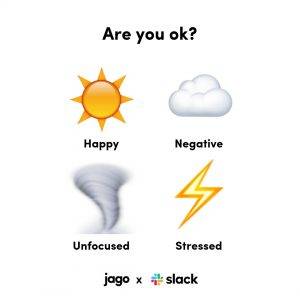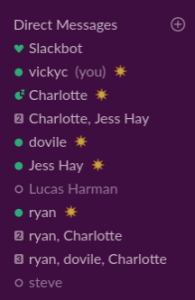Promoting good mental health in a remote team
How is your mental health today? Are you feeling ok?
How do you feel about your work right now? Are you coping ok with the demands of your work? Perhaps you need to take a bit of time out?
There are very few downsides to having a team that works mostly remotely, but one has to be that you can’t look someone in the eye and see how they’re doing. We have video calls all the time, and we chat all day long via one means or another – but actually making physical eye contact? Not really possible on a day-to-day basis.
Does that mean we don’t care whether our team mates are having a bad day? Not at all.
We are faced with a predicament I’m sure many other organisations have faced over the years. Both remote working teams and those working together in a physical office have had to come up with ways to help each other through harder times.
These days most organisations have some form of policy when it comes to mental health-related time off. Many places will even observe Mental Health Awareness Week. And of course, there was that viral post from the lady whose boss supported her decision to take a mental health day from work. Most people know what to do if they need to take time off.
But what if it’s not bad enough to warrant a day off?
Mental health is rarely black and white, and what if your struggle right now falls squarely in the grey area between needing time off and feeling on top of the world? What if you just feel a bit… rubbish? Many of us know first hand that what begins as feeling a bit rubbish can become something more serious fairly quickly, and work stress can add to that. Sometimes we’re just having a hard time, and although we’re fit enough for work we can’t really deal with the chit-chat and demands for attention.
In a normal office environment, you tend to pick up a sort of “do not disturb” vibe from people. If someone comes into work and you can tell they’re not in the mood for socialising you usually know to give them a wide berth. It’s usually fairly easy to spot if someone’s feeling a bit emotional. But our colleagues can’t see or otherwise pick up on a vibe from us; we have to be a bit more obvious about it all.
A mental health policy?
The problem we have found with many approaches is that policies are designed for people who are really struggling and perhaps need to seek professional help – and while these policies are vitally important, they don’t do much to cover the grey area between Sinking into a pit of despair and Feeling fantastic. Most mental health problems can fall into this grey area – at least in the beginning. And we’d like to think that with a little help and support, those problems that arise through and are aggravated by work stress could be nipped in the bud by businesses being a little more sensitive to people’s needs before things get darker.
We are all determined that working remotely needs to actually work for us; we don’t want anyone sitting at their desk alone and feeling awful about the number of messages they’re getting, or dreading having to attend a video meeting because they just can’t deal with people at the moment. That’s not energising or motivating at all, and it’s far from what Jago stands for.
How do you let your teammates know when you’re struggling mentally?
We wanted to find a way that each of us could give the others a sort of “heads up” that we’re not feeling great. A sort of online way of catching someone’s eye and saying I’m really not feeling up for socialising today.
Having asked around, it seems that we’re not the only organisation that has struggled with this sort of thing. Even people working in a physical office aren’t really sure of the best way to deal with it. We’ve all come a long way when it comes to mental health awareness, but there is still a long way to go.
Enter Slack
As it happens, we’ve found that working remotely could actually be an advantage. Whilst we can’t make eye contact and pick up vibes from each other, we use group messaging app Slack all day, every day to stay in touch. We use it for everything from managing the details of a project to making bad jokes and trading gifs – it’s our main form of communication, above even email (which is used mainly for external communication with clients).
Those who are familiar with Slack will know that you can set a status… but what’s more prominent within the app is the emoji attached to that status. We agreed upon a series of emojis that could be used to alert our team mates to the fact we’re struggling, without ever needing to send a message or verbalise anything.

We opted for a weather theme, because we felt that these emojis would not be used in normal day to day conversations in the way that many of the standard “face” emojis are. We also felt it best to use as few emojis as possible, so as to avoid confusion – people should be able to clearly see our general mood, without needing to consult a key.
How do you feel today?
From early on we noticed the difference it makes to have a happy team, and we know the difference it can make just to be aware when someone is struggling.
We have now adopted an approach where all of our team members are encouraged to stop each morning and ask ourselves, How do I feel today? We then choose one of four emojis to let our teammates know our current state of mind. Of course, we can change the emoji throughout the day if our mood changes too – and we’re encouraged to check in with ourselves after lunch.
The idea is that as well as letting others know how we feel, we can get into the habit of actually sitting down, taking a breath and checking in with ourselves. Sometimes our stock response might be Oh, I’m fine but actually we feel a bit stressed or emotional. By using these emojis we can communicate that to the rest of the team without needing to try and find the right words.
Finding the right words to explain how we are feeling can be a major problem. I feel unsociable today doesn’t quite cover that feeling of dread you can often feel at the thought of having to interact with others. And at the same time, we don’t want to actually come out and say Would you just stop hassling me – however much we might feel it!
We’re fighting against work stress
Work stress can be a major contributor to mental health struggles, and when you’re working remotely there can be the added burden of feeling isolated. Whilst it’s usually fairly easy to come up with a reason to get someone to hop onto a video call with you to blow off some steam and feel connected to the outside world again, it can be tricky to do the opposite.
An unexpected bonus of this is the happiness we all feel when we see that someone’s day has turned around. When someone has started the day feeling rubbish, but then their emoji changes and we can see that now they’re feeling good, that’s a mood booster for all of us.

Using emojis on Slack might seem like an over-simplification – and perhaps it is. But it’s a good place to start, and a way for us to take care of each other. That’s what team work is all about, after all – right?
We are always open to new approaches and we’d love to hear about how you deal with mental health grey areas in your business. If you have a novel approach to this do please leave a comment so that we can learn from you.
… and if you don’t already have a formal approach to this sort of thing, could you perhaps take our idea back to your business? You don’t need to use Slack to make this work; any form of traffic light system could be implemented to help your team communicate how they are feeling. Let us know how you get on!
Leave us a comment here or start a conversation with our Business Leader Ryan on LinkedIn.

